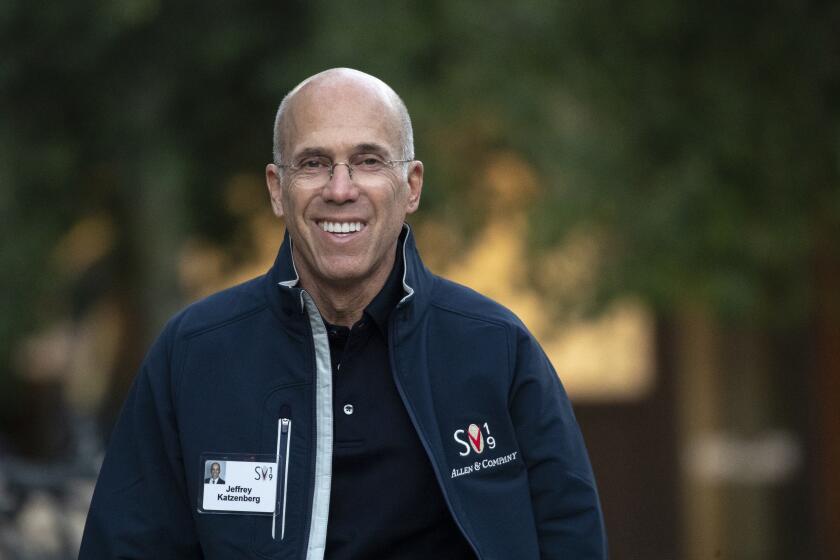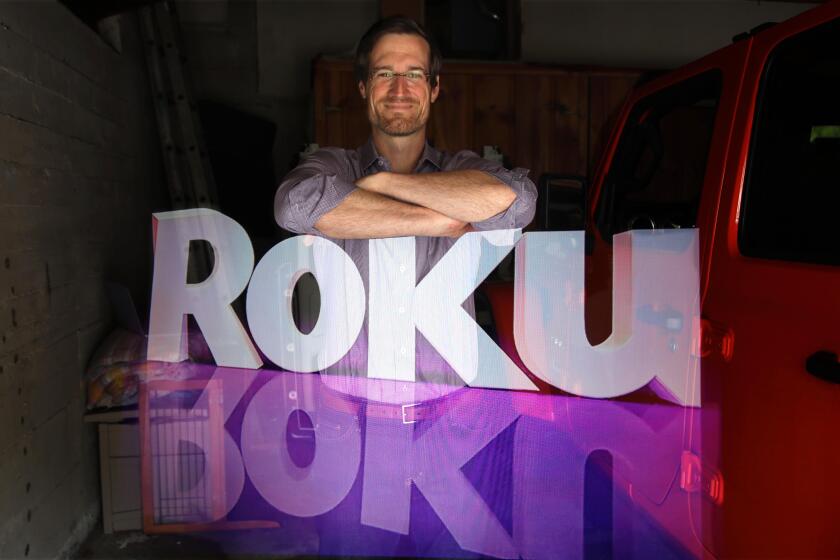Quibi died. Why its shows like ‘Die Hart’ might be revived on the Roku Channel
- Share via
When Cody Heller created “Dummy,” it had the ingredients of a hit show.
The comedy starred popular actress Anna Kendrick, and its story about a woman’s interactions with her boyfriend’s sex doll certainly had potential for water cooler talk.
But just six months after “Dummy” debuted on Quibi, the streaming service announced it was shutting down, causing more than 75 programs to go dark in December.
“The saddest part of it was, ‘Oh, no. Now “Dummy” is just gone — disappeared,‘” Heller said. “There’s no way to watch it now, and it all happened so fast.”
Now Heller has a second chance. On Friday, Roku said it had acquired the global rights to Quibi’s catalog. The shows — which include the Emmy-winning drama “#FreeRayshawn” — will later this year join the Roku Channel, a free, ad-supported streaming service.
Quibi’s decision to shut down the company is forcing more than 200 employees out of work.
Financial terms were not disclosed, but a person close to the sale who was not authorized to comment said the price was less than $100 million, a bargain, considering that Quibi had raised $1.75 billion, spending up to $100,000 a minute on programs.
The sale was welcomed by Heller and other creators left stranded when Quibi abruptly shut down. Although designed for mobile phone viewing, Quibi’s short-form shows could benefit from Roku’s wider distribution platform and marketing clout, analysts said.
The deal also gives the San Jose firm a roster of original programming, some with high profile celebrities who have large global followings.
Despite an absence of breakout hits, some of Quibi’s shows with A-list celebrities like “Dummy” or “Die Hart” starring Kevin Hart and John Travolta, were popular and could find success on a larger platform like the Roku Channel, some analyst said.
The Roku Channel, which reaches 61.8 million people in the U.S., has the scale that Quibi never had — both in viewers and advertising power.
“The benefit of anyone who buys the library is that it’s really high profile talent associated with high production value content that not many people have watched to this point,” said Sean Carey, a former Sony and Netflix executive. “It is one-stop shopping for content, which is unique. Still, a buyer would have to believe they could monetize that content sufficiently.”

Quibi in October concluded that it could not continue. The monthly subscription streaming service failed to get enough people to pay for programs told in chapters of 10 minutes or less. Quibi tried to target on-the-go millennial customers, but when the COVID-19 pandemic hit, the company had to quickly pivot. Poor marketing, a scarcity of hit shows and the lack of TV distribution at launch also contributed to its demise.
Shortly after the streaming platform launched, marketing consultants advised the company to change course, but they were largely ignored, sources said.
But consumers who didn’t want to pay for Quibi may be willing to watch the shows on a streaming service they already use, analysts said.
For example, “Cobra Kai,” a series based on “The Karate Kid,” debuted on YouTube Premium three years ago and moved to Netflix after YouTube said it was scaling back its investment in scripted series. Its third season on Netflix this year generated five times as much demand as that for its first season on YouTube Premium, said Alejandro Rojas, director of applied analytics at Parrot Analytics.
Similar to “Cobra Kai,” Quibi has shows based on popular movies, series and books, such as an updated version of the thriller “The Fugitive” and a new season of the comedy “Reno 911!” And many of stars have strong international followings, Rojas noted.
“The main advantage that Quibi content brings to the table is the fact that you have known currencies, either because it’s a known IP [intellectual property] or it’s being driven by top talents,” Rojas said. “That’s a really powerful combination.”
A dozen shows developed for Quibi that were never shown on the app will also make their debut on the Roku Channel, including the Farrelly Brothers comedy “The Now.”
Several Quibi creators, who enjoyed wide creative freedom and generous budgets, said they were thrilled their shows could be available again.
“For a creator, that a series can... live on for a new generation of viewers is really incredible,” said Veena Sud, the creator of “The Stranger,” a thriller that follows a ride-share driver tortured by one of her passengers.
Inside the business of entertainment
The Wide Shot brings you news, analysis and insights on everything from streaming wars to production — and what it all means for the future.
You may occasionally receive promotional content from the Los Angeles Times.
But not everything in Quibi’s library is desirable. Some of its daily news programs might be seen as outdated.
“I can’t see that having any value whatsoever,” said Evan Shapiro, a producer and former executive at NBCUniversal who sold a nonscripted series to Quibi that never got made. “They were made for a moment in time.”
Additionally, Roku also has to deal with Quibi’s unique contracts with creators. Under those licensing agreements, creators were given the rights to their shows after seven years and could shop longer versions to other platforms after two years on Quibi. And some who created shows specifically for Quibi may not want to see their content on a free streaming platform like the Roku Channel.

What’s more, Quibi shows were designed for mobile devices, with episodes in 10 minutes or less, keeping viewers in suspense. Roku says it will show advertising after each episode.
Programs were filmed in both landscape and portrait mode, allowing users to turn their mobile phones to change their perspective in a feature called Turnstyle. The company is facing a lawsuit over allegations it infringed on rival technology firm Eko’s patent. Quibi has denied wrongdoing. Roku said it did not buy Turnstyle, so Quibi shows on Roku will be available to view in only one format — landscape.
While some programs like prank show “Punk’d” might work in its short format, some analysts questioned whether consumers would spend much time watching so-called bite-size programming.
Roku in particular is “mostly about the living room, and short-form content hasn’t historically succeeded there,” said Carey, the former Netflix and Sony executive.
Carey added that while he was at Netflix, the company experimented occasionally with short form content but never found that it generated sufficient user engagement.
“When you’re sitting in your living room, you’re in a setting where you want to relax for a longer period of time than just watching quick bites of content,” he said.
Roku’s vice president of programming, Rob Holmes, said he believes Quibi‘s TV quality content will be successful on the Roku Channel.
“We think if you watch it and you lean back, it runs just like TV,” Holmes said Friday. “We think that’s a big opportunity that we’re excited to get a chance to take advantage of and it’s highly promotable with all this talent. You know, who’s not going to watch a free Kevin Hart show?”
Roku makes money by selling connected-TV hardware and licensing its technology, as well as through advertising and taking a cut of subscriptions made through its platform. The company has long positioned itself as a one-stop hub for customers where they can access a variety of streaming platforms through Roku — whether it be Netflix, Disney+ or HBO Max.
Roku has seen a surge in viewership during the pandemic, as people have looked for ways to entertain themselves at home. Viewers spent 17 billion hours streaming on Roku in the fourth quarter of 2020, up 55% from a year ago, the company said. The company posted a $12.9 million profit in the third quarter, up from a net loss of $25.2 million a year ago.
Roku’s fortunes have brightened considerably since the COVID-19 pandemic halted production in Hollywood and confined people to their homes.
But Roku is facing increasing competition as other companies launch their own streaming apps.
For example, Apple offers incentives for customers to bundle their watching through Apple TV+ with other services, including music streaming through Apple Music. Those packages can undercut a consumers’ need to go to Roku rather than staying within the Apple ecosystem.
One way to entice more consumers to use the Roku Channel is by showing Quibi content and selling ads against it.
Roku has not funded its own original productions, but that could change as it forges ties with high-profile creators.
“This may be a cheaper spend than fighting it out against the Netflixes of the world, or fighting it out against Amazon, who is spending a lot more,” said Eugene Lee, chief executive of Creator Cash, a San Francisco-based app that serves video creators.
It is possible for shows that were once on defunct streaming services to start fresh on a new platform.
Tug Coker said it took about two years and 16 rejections to find a home for his comedy series “Now We’re Talking” after Verizon’s Go90 shut down in 2018. The show‘s two seasons became available on the CW Seed streaming site last year.
“We’re just happy to have an opportunity finally for people to see the show, because so few people actually watched Go90,” said Coker, the show’s co-creator. “It’s actually an opportunity for people to see the show as a whole for the first time.”
More to Read
Inside the business of entertainment
The Wide Shot brings you news, analysis and insights on everything from streaming wars to production — and what it all means for the future.
You may occasionally receive promotional content from the Los Angeles Times.













